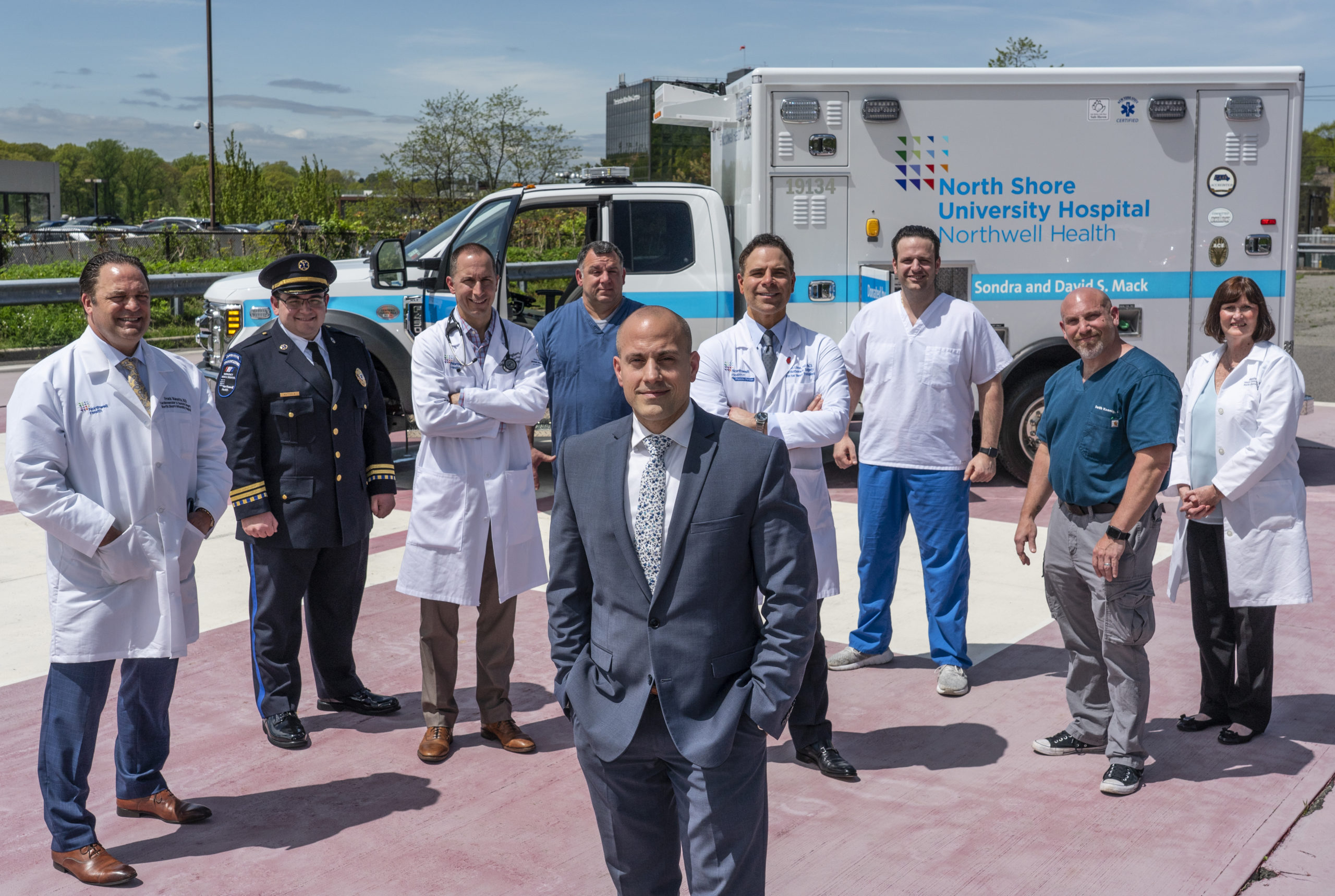Harnessing its expertise in cardiac and lung care, a team of medical specialists at Northwell Health is traveling to area hospitals to treat patients who are so critically ill they cannot be moved and need a life-saving extracorporeal membrane oxygenation (ECMO) machine, which replaces heart and lung function.
With a mortality rate of about 50 percent in critically ill patients needing ECMO, the concept of a mobile team grew out of an established acute-lung injury program at Long Island Jewish Medical Center (LIJ) in New Hyde Park and the heart transplant program at the Sandra Atlas Bass Heart Hospital at North Shore University Hospital in Manhasset. Known as the ECMO-TO-GO program, it is the only one of its kind offered on Long Island. The team of physicians, clinicians and administrators will be awarded Northwell Health’s 12th annual President’s Award for Teamwork for its life-saving program. The team will accept the award on July 15 at a gala and ceremony at the Crest Hollow Country Club, along with winners in five other health care categories.
“Teamwork is only the beginning of what makes the ECMO-TO-GO team successful,” said David Brody, vice president of Northwell’s cardiothoracic service line. “The strength of the group comes from its ability to use their differences in expertise to meet the dire needs of a complicated patient population. They do so with seamless coordination, compassion and communication, ultimately forging something stronger than any individual person.”
The ECMO machine returns oxygen to the blood and removes carbon dioxide—functioning just as healthy lungs. It ensures that the patient’s body has enough oxygen, allowing the failing organs to rest and recover. When the heart or lungs have healed and can work on their own, the patient is gradually weaned off the ECMO machine. Patients with severe but reversible heart or lung disorders who have not responded to such treatments as mechanical ventilation, medications and oxygen therapy are candidates for ECMO.
Many hospitals do not have ECMO equipment or the expertise to administer the procedure. Northwell established the program in 2018, recognizing the gap in critical care for the sickest patients in the community who are unable to be transported. The team can be dispatched by ambulance 24/7 to Northwell facilities and other hospitals in the New York metropolitan area. When needed, the team can also access Northwell’s medical helicopter, SkyHealth, to cut down on travel time.
Once patients receive mobile ECMO care, the medical team transports the patients and returns to LIJ, NSUH or Southside Hospital, in Bay Shore depending on the patient’s condition and location.
One grateful patient of ECMO-TO-GO recently shared her harrowing medical story after traveling with her husband on Valentine’s Day for a two-week cruise to Spain. Judy Roes, 69, of Ontario, Canada, an avid international traveler and retired home care nurse, said the ship had recently been sanitized for an airborne virus. During the voyage, Roes developed a cough and flu-like illness. She spent the last two days of the trip in the ship’s hospital. Roes and her husband boarded a plane headed to JFK airport for a connecting flight back to Canada. When she landed in New York, an ambulance was waiting for her and brought her to Jamaica Hospital. Doctors there alerted Northwell’s ECMO-TO-GO team. Roes was connected to the ECMO machine and the team brought her to LIJ Medical Center.
“My family was told I had a 30 percent chance of survival,” Roes said. “The team at LIJ saved my life. My doctors in Canada said, ‘You were in the right place at the right time.’”
Roes spent 14 days in the cardiothoracic intensive care unit where she was sedated, paralyzed and lost 20 pounds. Her kidneys shut down, requiring dialysis. She also experienced a cardiac event. Despite Roes’ dire situation, she improved enough to get weaned off ECMO. She had forgotten how to walk and still needed dialysis. But she was well enough to return home and get further treatment at Kington General Hospital in Ontario.
“The care was really amazing at LIJ,” said Roes. “The nurses kept my family up to date and made us feel at ease, which made a big difference.”
Five months after Roes’ life-threatening medical odyssey, she said she is “determined to live life.” She and her husband, Ray, often take long-distance motorcycle trips. But, their next vacation will be a train trip thorough the colorful Rocky Mountains in Colorado.
Submitted by Northwell Health



